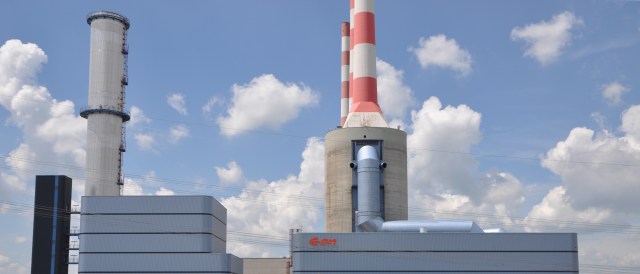And then there were three… E.ON, one of Germany’s Big Four utilities, is selling its conventional power plant fleet. Is this a special case, or is E.ON setting an example for the other utilities? Craig Morris investigates.

Utilities heavily invested in natural gas are suffering most – E.ON was one of them. (Source : Dominik Zehatschek/E.ON)
In 2010, Germany had four utilities that made up roughly three quarters of total power generation: E.ON and RWE, the two largest ones who vied for first place; Vattenfall, a subsidiary of the Swedish government in third place; and the smallest one, EnBW.
Fast-forward to today: EnBW is now practically a ward of the state under, ironically, Germany’s first Green Governor. The state of Baden-Württemberg grossly overpaid France’s EDF for its holding in the company back in December 2010 – a decision made not by the Greens, however, but by the preceding coalition voted out of office in 2011. The nuclear phaseout of that year further worsened EnBW’s assets.
Vattenfall is also in the news for its plans to sell its coal power assets in Germany. The firm generates more than half of its electricity in Germany from coal, and it only has a holding in one nuclear plant – a minority stake in Brokdorf. Likewise, RWE posted its first lost since World War II last year in Germany.
Casual passersby might understandably conclude that the transition to renewables and/or the Energiewende is bad for big utilities. Yet, Vattenfall is leaving Germany not because its coal plants are losing money, but because the new Swedish government puts concerns about carbon emissions ahead of profits. Indeed, the Swedes already have a potential buyer for its German coal assets.
The outcome in Germany clearly pertains to specific events in Europe, which helps explain why E.ON is also looking into backing out of conventional power in Spain, Portugal, and Italy – though, tellingly, not the UK. The British are concerned about power shortages and undersupply, whereas Italy is looking to start closing down coal plants before their service lives are up. Likewise, Spain has a few dozen gigawatts of underused combined-cycle gas turbines; wind power was the largest single source of electricity in the country last year. And while Portugal has largely built wind power, not solar, the government issued a decree last month (PDF in Portuguese) specifying rules for direct consumption of PV, with excess sold to the grid – so the boom in PV may just be getting started in Portugal.
The German nuclear phaseout indirectly favors RWE over E.ON. E.ON is heavily invested in natural gas, the big loser across Europe at present in the power sector, and has roughly as much nuclear power as coal power. In contrast, RWE generated roughly 4 times more electricity from hard coal and lignite than from nuclear in 2013. German utilities are at least still breaking even with coal power, while gas is a losing investment, and nuclear is being phased out. E.ON’s decision thus makes a lot of sense.
RWE’s better position as primarily a coal company also helps explain why it reacted to E.ON’s announcement by stating that it does not plan a similar move (article in German). RWE might not be doing great, but it may (justifiably) have a more positive outlook than the other three big utilities in Germany.
What lessons are there for utilities in other countries? In general, the risks are changing. Photovoltaics, which grows fast and quite uncontrollably, ruins the profitability of conventional generators at midday. But other countries lack Germany’s bottom-up renewables movement, so utilities can better control the growth of solar – and they will be the ones building practically everything else. In this respect, German utilities face a much different business environment.
One final question: is Germany ruining the profitability of companies that will provide the backup power that wind and solar need? Let’s make one distinction clear: we need dispatchable capacity, which does not require giant utilities that are global players. Smaller utilities and municipals can also provide dispatchable capacity. It remains to be seen what the role for giant utilities is at the end of the transition to renewables, but by conflating utilities with dispatchable capacity, we ensure that these large firms get a larger share of the pie than is needed.
Craig Morris (@PPchef) is the lead author of German Energy Transition. He directs Petite Planète and writes every workday for Renewables International.
Another way to look at this is the end of traditional energy market in Germany. Power generation is increasingly regulated by government. As renewables grow, the regulated percentage will increase. Capacity payments for traditional energy companies are another form of regulation. One thing is clear: no private company wants to be in the business of losing money and power generation by traditional means in Germany is not going to be profitable.
EU reaction to this development will be interesting as they still want to promote market system for electricity generation and cut regulation.
@Jarmo: The traditional power market was one of vertically integrated monopolies. Government regulations broke these vertically integrated companies up, finally allowing for competition.